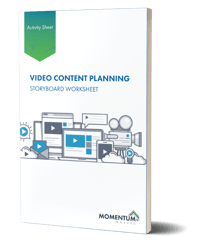
Get the edge over other buyers, and a $10,000 seller guarantee
I Want the Edge!
1749 Mallory Lane, Suite 100, Brentwood, TN 37027
Storytelling has been a part of the human connection from the beginning of time. It is the art of sharing an experience and inviting another human to engage with your story. Storytelling evokes emotion and stimulates the mind. It inspires, teaches, entertains ... and it sells!
2020 is the year of video marketing! You need to include it in your overall content strategy, but where do you start? How do you get your videos to stand out in an ocean of video content? It's simple – start with telling a story.
You might be reminded of your creative writing class from high school as we dive into this subject. But have no fear, the following tips will make it easier to ace.
Storytelling is the ability to pass information on to another person through a story. The elements of good storytelling are quite simple and can be summed up in 5 key principles:
1. Keep it simple: Good stories are easy to understand. They consider the audience first. They're intentional, clear, and concise in what they are communicating and to whom they are communicating.
2. Evoke emotion: Happy or sad, silly or scary. Good storytelling triggers a real human emotion, it's compelling. Using emotion perks the interest of the audience, keeps them engaged and makes a lasting impression.
3. Create buy-in: Storytelling shapes the truth for the audience. It believes in the narrative of the story, it's honest with itself and the audience.
4. Keep it real: A true story or a story that has been experienced first hand is more effective than anything made up. Humans want to feel the experiences of the storyteller. They want to be invited into that moment and relate it.
5. Spark action: Whether it's an audience of one or a million, the story should be well-structured and translatable to anyone who listens. The timing or subject matter of a well-constructed story will stimulate the audience to take action.
Now that you have the 5 principles of what makes for good storytelling, it's time to tackle the best practices to take those elements and turn them into storyboards for videos.
A storyboard is the visual outline of each scene and the important elements of the message you want for your video. Don't worry, a storyboard can be as simple or complex as you choose (download our storyboard worksheet to make it really straightforward).

Storyboarding is the initial step to making a video. It is your planning session where you map out the look and feel of the video, organize your creative thoughts, highlight what you want to say without having a full script, and gives focus to your core message. Storyboarding helps provide you direction without having to hire a director.
1. One-to-one: Simple is the goal. One topic per video. This keeps your videos easy-to-follow and manageable.
2. Outline the objectives: Every English teacher you've ever had told you to make an outline. This crucial step keeps you from becoming distracted and guides you to thoughtfully plan exactly what your video needs to achieve.
3. Identify your target market: Who are you talking too? Decide who you are wanting to reach with your video and then communicate to them in their voice. (This is a great time to review our 3 Steps to Increase Your Social Engagement eBook)
4. Keep your core message in focus: How do you want your audience to relate to the video? Do you want to them to feel a certain way? Or take a specific action after watching your video? When storyboarding make sure you successfully communicate your main message so your audience can remember it and then take action.
5. Map out the extras: As you break up your video into scenes think about if you want to add any animated images, words, graphics, or sound effects into those scenes.
By utilizing the principles of storytelling and being dedicated to the process of storyboarding you will be able to craft video content that evokes action, speaks directly to your target audience, has a clear message, and ultimately increases your engagement.
Happy planning!
By submitting this form, I/we agree to your Privacy Policy Terms of Use and authorize Churchill Mortgage Corporation and/or their Preferred Provider for our area and/or The Churchill Agency to receive the above information to assist in obtaining a home loan.
I/we also authorize Churchill Mortgage Corporation, The Churchill Agency and/or their Preferred Provider for our area to contact us regarding but not limited to mortgage and insurance services and products via telephone, mobile phone (including through automated dialing), and/or email, even if telephone numbers or email I/we provide are on any Do Not Call/Contact Registry, such as corporate, state, or the National Do Not Call Registry.
The submission of this form does not constitute in any way a formal loan application or a commitment for a loan. By communicating with us by phone, you consent to calls being recorded and monitored. By participating, you consent to receive text messages sent by an automatic telephone dialing system. Consent to these terms is not a condition of purchase.

Agent Resources is created and managed by Churchill Mortgage, NMLS: 1591.
Churchill Mortgage Corporation, NMLS #1591 is an Equal Housing Lender - ©2020 All Rights Reserved. Programs are for select loan types only and are not available in all states or locations.
NMLS Consumer Access Privacy